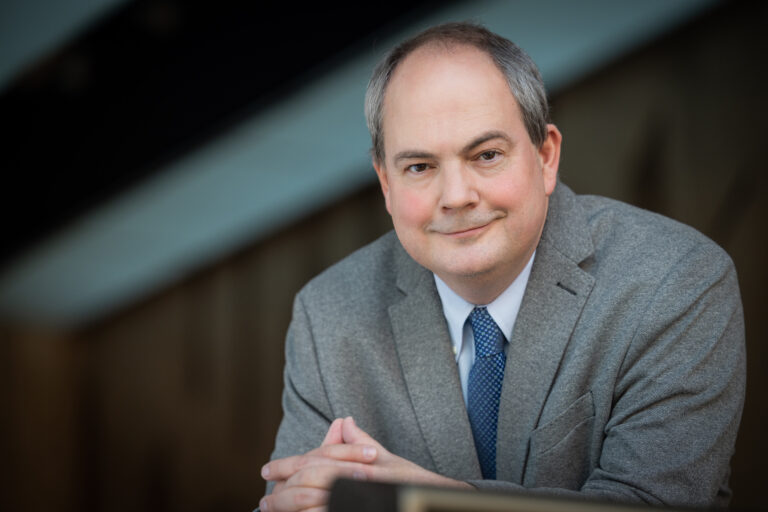He conducted his first concert at the age of 16, performed Mozart’s
Die Zauberflöte at his graduation concert, and conducted Gluck’s
Orfeo ed Euridice at the Budapest Chamber Opera as his opera debut. He regularly serves as a guest conductor with most Hungarian symphony orchestras and made his debut at the Hungarian State Opera in August 2000 with Haydn’s
L’infedeltà delusa. He has conducted hundreds of opera performances there since then, mostly works by Mozart and Verdi, as well as, in the area of contemporary music, the 2005 world première of Levente Gyöngyösi’s
The Stork Calif and, on period instruments in 2013, Rameau’s
Hyppolite et Aricie, at the helm of the Purcell Choir and Orfeo Orchestra.
He founded the former ensemble in 1990 and the latter in 1991. With them under his leadership over the last 30 years, he has created countless important opera and oratorio productions and cantata and orchestral programmes. Their repertoire spans approximately 250 years, ranging from Gesualdo to Mendelssohn: constant fixtures on their programmes are Bach’s passions, oratorios, cantatas and motets, as are the works of Monteverdi, Purcell, Rameau, Handel, Mozart, Haydn and Mendelssohn. Between 1998 and 2009, together with the choir and the orchestra, he conducted an important Haydn cycle at Fertőd-Eszterháza, in which they performed all of Joseph Haydn’s pre-London symphonies, masses and oratorios in German.
Vashegyi’s research activities have led to his being credited with many modern world and Hungarian premières and performances, and he has made almost 40 recordings at the head of his ensembles, including for the Hungaroton, Carus, Ediciones Singulares, Accent, Aparté and Glossa labels and featuring the works of Tunder, Charpentier, Purcell, Geist, Bach, Tartini, Manna, Rameau, Mondonville, Istvánffy, Michael Haydn, Joseph Haydn, Mozart, Kraus, Lickl, Méhul, Conti, Stölzel and Gyöngyösi. He nurtures an intensive working relationship with the Baroque Music Center in Versailles and its artistic director, musicologist Benoît Dratwicki. In chronological order, he has had the following French Baroque recordings released on the Glossa label: Rameau:
Les Fêtes de Polymnie, Mondonville:
Grands Motets, Mondonville:
Isbé, the opéra-pastiche
Un opéra pour trois rois compiled by
Benoît Dratwicki, Rameau:
Naïs, Rameau:
Les Indes galantes, Gervais:
Hypermnestre, Montéclair:
Jephte, Boismortier:
Les voyages de l’Amour, Rameau:
Dardanus, Rameau
: Les Fêtes d’Hébé. Glossa also released the Graun-Bach-Telemann pasticcio passion
Wer ist der, so von Edom kömmt. With the Accent label, he has begun a new series of forgotten treasures from Hungary’s musical heritage. Symphonies released so far: Haydn:
Day Trilogy, Werner:
Der Gute Hirt, Haydn:
Symphonies Nos. 24, 30, 42, 43. Released at the same time was Lemoyne’s opera
Phédre, courtesy of the Bru Zane label. Glossa also released, as a world première, the passion
Ein Lämmlein geht und trägt die Schuld by the now nearly forgotten master Stölzel.
Les Fêtes de Polymnie,
Un opéra pour trois rois,
Nais and
Hypermnestre won France’s Opéra Magazine’s “Diamant de l’Opéra” award, while
Les Fêtes de Polymnie and
Nais won the German “Preis der deutschen Schallplattenkritik” award, with the former,
Jephté and
Les Fêtes d’Hébé also winning the prestigious “Diapason D’Or”, and
Phédre receiving the “Diapason d’or decouverté” award.
Vashegyi has taught at the Liszt Academy since 1992, currently as an associate professor and director of the Early Music Group founded under his leadership in 2010. In recognition of his work, he received the Liszt Award in 2008 and the “Knight’s Cross of the Hungarian Order of Merit Civil Division” in 2015. In 2021, the French state awarded him the honorary title of “Chevalier L’Ordre des Arts et des Lettres”.
He has been a member of the Hungarian Academy of Arts since 2013, whose general assembly elected him president of the HAA (MMA) for the first time in October 2017 and for another three-year term in 2020. He has served as the president of the National Cultural Council since 2020 to 2024.
On the occasion of Hungary’s national holiday on 15 March 2024, in recognition of his valuable work as an artist and in artistic public life, he was the country’s highest state decoration, he was awarded the Kossuth Prize.


